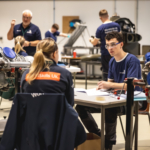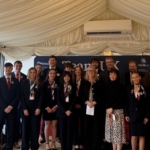Anyone who doubted the need for action on social mobility across England, Scotland, Wales and Northern Ireland should take a look at the Social Mobility Commission’s recently published Social Mobility Barometer. Its findings underline why governments, businesses and all of us involved in education need to make a priority of ensuring that young people from all backgrounds are empowered to achieve their potential.
According to the Barometer, just 1 in 7 young people today are optimistic about their ability to progress in work and life. Only 13% say their generation will have the best standard of living, and 12% believe they will fare best in terms of personal finances, compared to older generations. Overall, nearly half of young people (45%) think that where they end up in life will be determined by their background and who their parents are, rather than their talent and hard work.
There’s better news when the Barometer asked for views on young people’s progression opportunities after school: most people (30%) said that apprenticeships offered the best route to a successful career, above going into higher education. Given society’s focus on a university education as a means of progression over the past 20 years, this has to represent a perceptions breakthrough for apprenticeships and as such is something to welcome.
It was in that spirit that we convened a roundtable at WorldSkills UK LIVE, the UK’s biggest and best skills and careers event in November 2018 with a range of our partners including BAE Systems, Grant Thornton and the Social Mobility Foundation. As the Social Mobility Barometer findings demonstrate, the scale of the challenge we face is stark and one key stat stood out: A low ability child from a high-income family is 35% more likely to be a high earner than a high ability child from a low-income family.
Many of our employer partners are alert to these perceptions and have taken big steps towards ensuring their recruitment processes offer the fullest of opportunities to young people. We heard from Grant Thornton who do not ask about young people’s qualifications or work experience but focus on the skills and abilities they have to carry out the job. They also provide coaching and support at the interview stage to give all young people applying a good chance of doing themselves justice. Grant Thornton’s proactive approach has seen them place first in the Social Mobility Index and earned them the Queen’s award for social mobility.
At the roundtable we also heard from Anastacia, a young person who has successfully been through the apprenticeships programme offered by another of our employer partners, BAE Systems. Anastacia explained the challenges she faced as a single parent with mental health issues. With the support of Movement to Work, she found out about the opportunity at BAE and progressed from work experience to apprenticeship to her current plans for an MBA. She explained how this was made possible through the tailored support and mentoring that her employer offered. It’s this attention to detail and sensitivity to young people’s often complex and individual needs that is allowing leading businesses like BAE and Grant Thornton to ensure they are accessing a broad range of socially diverse talent.
The question for our roundtable was how to spread this best practice, and it came up with five recommendations. Firstly, set the tone at the top. For social mobility to happen, it can’t be seen as a ‘nice to have’ and this means the endorsement of senior leaders, from the CEO down, who are prepared to engage with schemes such as Movement to Work and personally drive a culture of change. Secondly, recognise the importance of fair and equitable recruitment processes which embrace applicants from all socio-economic backgrounds and pay more attention to skills and abilities as opposed to narrowly focusing on qualifications. Thirdly, listen to young people – this is vital if we are to build the trust needed for them to see viable career paths which allow them to fulfil their potential. Fourthly, recognise that change will not take place in isolation and that better partnership working between all agencies with an interest in social mobility is key. This means government, business and the education sector working together to identify the sector- and region-specific plans necessary to offer young people the best possible opportunities. Finally, the business case for social mobility has to be made: that it is not just about doing ‘the right thing’ but that it can translate into increased prosperity too. Indeed research from the Sutton Trust shows that even a modest increase in UK social mobility, to the average levels seen in Western Europe, could be worth £39bn to the UK economy as a whole.
The findings of the Social Mobility Barometer are an important wake-up call for all of us who care about this issue. Too many of our young people do not feel that the way the economy works is allowing them to realise their ambitions. We can’t take these findings lightly and the onus is on all of us to work together to transform not only the perceptions of social mobility across England, Scotland, Wales and Northern Ireland but the realities too.
WorldSkills UK is determined to make a difference in this area through our work. Over the next year we will do even more to ensure that young people from socially disadvantaged backgrounds are able to take part in our skills competitions to help accelerate their development and self-confidence. And we will work with employers to help them become Young People Ready by offering our expert training and best practice to enable the development of productive workforces that draw on the widest possible talent. We need to shift the dial on the social mobility barometer and we cannot waste a second.


